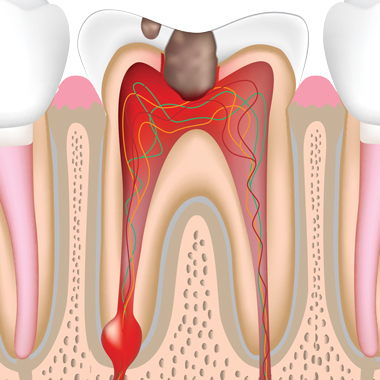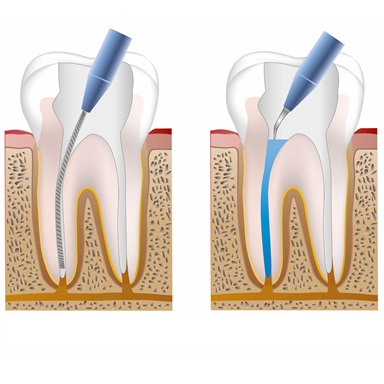Root Canal

A root canal is a treatment to repair and save a badly damaged or infected tooth. The procedure involves removing the damaged area of the tooth (the pulp), cleaning and disinfecting it and then filling and sealing it. The common causes affecting the pulp are a cracked tooth, a deep cavity, repeated dental treatment to the tooth or trauma. The term "root canal" comes from cleaning of the canals inside the tooth's root.
When Is Treatment Needed?
Usually, root canals are recommended or needed when there is an infection deep within the tooth. The pulp inside the tooth can become infected with bacteria because of an injury or because of a severe, untreated cavity. Without treatment, the infection can become severe enough that the tooth has to be removed. If we have recommended the treatment, here is a step-by-step guide of what you can expect during and after the procedure.
How a Root Canal is Performed?
Using local anesthesia to numb the tooth. After the tooth is numb, we will then use very small tools, such as a small drill, to access the inside of the tooth by creating an opening in the top portion of the tooth. Next, we will use small files to clear away the damaged and diseased pulp from the inside of the tooth. We will also use the files to shape the inner chamber of the tooth and root and might irrigate the chamber with water to wash away any remaining pulp. We also put an antimicrobial solution in the chamber to kill any remaining bacteria and reduce the risk for further infection.

Once the chamber is thoroughly cleaned and dried, then we will fill it. A rubber-like material called gutta percha is often used. We will close the opening in your tooth with a temporary filling, while you wait for the permanent crown.
After a few weeks, we will finish the treatment by placing a permanent crown or a similar type of restoration on the top of the tooth. Depending on the condition of your natural tooth, the dentist may need to place a small supporting post inside of the root chamber, to make the crown or restoration more stable.
Its one of great service provided by Dr. Chetan Darne's CHINTAMANI DENTAL CLINIC, Civil Line, Yavatmal. Dr Ashwini is dedicated to the world class root canal therapy thats provided at our clinic. what makes us different?
1. experience of 15years , thousands of root canals exclusive practice , Dr Ashwini dedicates herself in different knowledge upgradation courses.
2. state of art instruments : superb instrument along with skilled operator paves best and long term results.
3. ground force : we have dedicated staff with their exclusive interest in the field of endodontics , they undergoes periodic training in assistant ace , instrument handling , follow ups.
Which instruments are needed in good root canal treatments:
1. Rubberdam
2. Rotary endodontic file ( different systems are their they determine costs and perfection.
3. Irrigation systems ( irrigation machines and quality irrigants)
4. Radiology (root canal anatomy is complex , one need multiple iopa for perfect results)
5. Sealers ( many different sealers are available starting from water soluble to bioceramics , we use best in class )
6. Gutta percha and condensing devises :hermetic seal is prime requisite we provide it with specialized instrument and gutta percha.
7. Post endodontic restoration is the most important for functional restoration of your tooth we do it with great skills and best materials.
Root Canal of Teeth by Dr. Chetan Darne